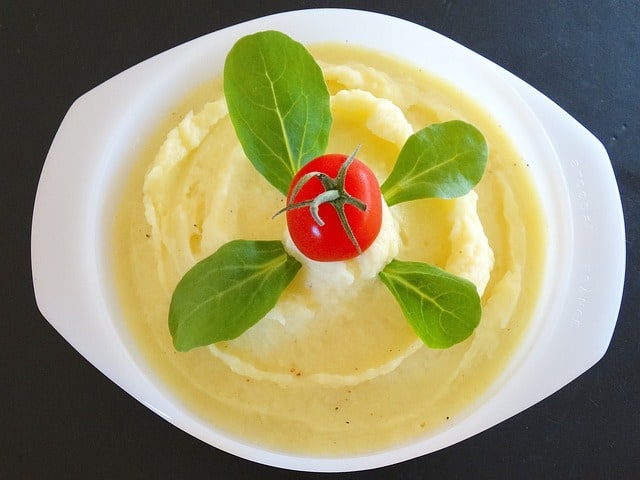Which is the best option? To keep mashed potatoes on the counter stored inside a casserole dish that is properly lidded, or to put it inside the refrigerator?
According to the USDA, the latter is the best option.
This article discusses why mashed potatoes need to be refrigerated, and it also outlines the steps to follow in order to successfully refrigerate mashed potatoes.

It is a necessity to refrigerate mashed potatoes
Yes you heard that right. Mashed potatoes must be refrigerated after bringing them down from the heat.
The reason why is because it is very easy for food items to become dominated by food, spoilage organisms or food pathogens when left at room temperature, especially temperatures that are in the excess of 90°F, which are easy to clock at summer times.
It’s no magic that the temperature outside the refrigerator in your home will most likely fall between 40°F to 140°F, which happens to be the temperature range where these organisms thrive best.
At this temperature, they will be able to feed on the food and derive nutrients from it which causes them to reproduce and therefore dominate the medium they are in.
Now one key distinction needs to be drawn between food spoilage organisms and food pathogens.
The former is the reason why foods pick up slimy and smelly states while the latter is responsible for the visits people make to the hospitals.
While it would likely take several hours to even a day for you to begin to see the activities of food spoilage organisms: sliminess, smelly food, discoloration on the top of food and visible microorganism growth, it is impossible to detect the presence of food pathogens in food.
So, in fact, food pathogens are the main reason why we must never keep perishable foods like mashed potatoes outside the refrigerator since the presence of food spoilage organisms in it would, most of the time, not be threatening.
How long do mashed potatoes last at room temperature?
After you bring down mashed potatoes from the heat, you have the grace of 2 hours to allow them to sit at room temperature (where they cool) before you put them inside the refrigerator to store; 1 hour if the temperature is greater than 90°F.
After the expiration of this time, the internal temperature of the food must’ve declined from its hot piping state (140°F) which would then give the bacteria a suitable medium for growth.
If you’re wondering where these organisms come from, it’s from the atmosphere.. It carries them in the form of spores or vegetative sprouts, and once they land in any medium that seems suitable for their growth and survival, they settle, feed, breed and dominate.
Would eating left out mashed potatoes make you sick?
It is generally agreed that eating left out mashed potatoes dominated by food spoilage organisms won’t make the majority of people sick, but could make people irritated or nauseous.
On the other hand, consuming food that is dominated by pathogenic bacteria, or organisms has a good potential to make one sick. This is because these types of bacteria are the ones responsible for illness.
Because it is impossible to identify when a food is dominated by either food spoilage bacteria or food pathogens, it is best to discard any perishable food like mashed potato that has sat out for long, especially overnight, especially when the temperature outside the refrigerator is high.
What is the best way to store mashed potatoes?
When it comes to the best way to store mashed potatoes, many health authorities advocate the refrigerator.
In the refrigerator the temperature is typically below 40°F so long as the refrigerator is working properly.
At this temperature, the activities of bacteria are slowed (though not stopped completely which means they will eventually manage to breed and cause spoilage) which makes the food safe for some period of time.
In the refrigerator, leftover mashed potatoes are expected to last a solid 3 to 4 days after which the activities of spoilage bacteria can begin to surface such as the growth of mold or sliminess or smell.
So how do you properly store mashed potatoes in the refrigerator?
In order to do so, you need to make sure that the mashed potato was cooked properly to begin with. This means that the internal temperature of the cooked mashed potato must’ve read 145°F using a food thermometer. This is essential in order to ensure the safety of the food during storage.
After bringing down the mashed potato from the heat, it must not exceed more than 2 hours before you package it in a freezer safe bag, or plastic container and put it inside the refrigerator to store.
You have to make sure that the container is airtight so that the mashed potatoes will store in the absence of moisture and air. Additionally, you want to make sure you keep the mashed potatoes away from the dripping juice of meat, or from food items that exudes smell.
Do mashed potatoes freeze?
It’s absolutely possible to freeze mashed potatoes although it is not recommended because freezing does a lot of damage to food.
Freezing causes food items to turn watery and mushy, especially those that contain a lot of water in them as it freezes the water which causes the cell walls that hold these molecules of water in the first place to rupture.
Frozen mashed potatoes, however, would last a solid 3 to 4 months in the freezer, although they would begin to lose their taste and smooth consistency in as little as 1 month into freezing.
Storing leftover mashed potatoes in the fridge is quite easy. Make sure to package them in a freezer safe container like a plastic bag, remove as much air as possible and put them inside the freezer to store.
Do not forget to label the bag or container with the date of storage as well as the name of the food.
When it’s time for you to use the frozen mashed potato, take it out from the freezer and put it inside the refrigerator to thaw. Take note that you are likely to experience textural change as well as run into a runny mashed potato after thawing, but you can follow the many tricks and tips of the internet to rescue back your mashed potatoes.
An alternative, and the best way to go about things is to reheat the mashed potato on the stove top directly without thawing.
Simply transfer the frozen mashed potatoes onto a pot or a saucepan, add more milk or cream to it and cook until the internal temperature reads 165°F.

